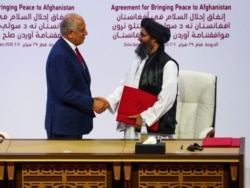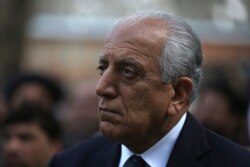The Taliban rejected Tuesday an annual United Nations report that questioned the Islamist insurgency’s intent to live up to the terms of a landmark agreement with the United States to help find a political resolution to the nearly 19-year-old war in Afghanistan.
A harshly worded Taliban statement berated the U.N. findings as “baseless, intelligence-based and bigoted remarks” against the group.
The U.N. Sanctions Monitoring Team in its report, released Monday, accused the Taliban of not breaking ties with al-Qaida as part of counterterrorism assurances in the agreement.
The U.N. assessment, based on interviews with intelligence and security agencies of member states, as well as independent research groups, also cast doubts on the Taliban’s pledges it would engage in intra-Afghan negotiations to reach a permanent cease-fire in the conflict-torn country.
“All in all this [U.N.] report is constructed with the aim of harming and derailing the US-IEA agreement … to keep the fire of war raging in our homeland,” the Taliban asserted in its statement, using the acronym for its ousted government in Kabul.
The group insisted it was committed to implementing its end of the peace deal and “will not allow anyone to use the soil of Afghanistan against anyone else or maintain training camps or use our soil to fundraise against others.”
The Taliban described the agreement with the U.S. as an “important tool” for ending the war and establishing “enduring peace and security” in Afghanistan. It also dismissed U.N. suggestions of rifts in the Taliban ranks, saying they “are united, are free of all discord and factionalism.”
The U.S.-Taliban agreement requires American and coalition forces to withdraw from Afghanistan by mid-2021 in return for assurances the Taliban would not permit terrorists to use its held areas for international attacks. The American troop drawdown already has begun.
The Taliban also has pledged to open talks with representatives of the Afghan society to negotiate a sustainable cease-fire and power-sharing arrangement in post-war Afghanistan.
US envoy upbeat
Despite the bleak outlook from United Nations members, a top U.S. official remained optimistic the deal with the Taliban will hold and that negotiations between the Taliban and the Afghan government can succeed.
"We’re in a good place,” Ambassador Zalmay Khalilzad, the U.S. special representative for Afghanistan reconciliation, told reporters Monday, adding the U.S. continues to watch developments on the ground.
“We have a monitoring group that monitors in detail what's happening with regard to their commitment, the Taliban’s commitments, on terrorism," he added. "We believe that there is progress, but we will continue to monitor those activities very closely.”
Khalilzad noted that a prisoner swap between the Taliban and the Afghan government was moving forward and its completion would set the stage for intra-Afghan talks.
“The road ahead will have challenges and difficulties. But we're optimistic that finally we are moving forward to the start of the intra-Afghan negotiations.”
UN report
The U.N. report, however, stated the Taliban remained confident it could take power in Afghanistan by force in the event of foreign troop withdrawal. It noted that international support for Afghan security forces, specifically “close air support” from the U.S.-led coalition, has been essential to keeping Taliban forces at bay.
“The risk exists that they [the Taliban] will continue to find reasons to delay intra-Afghan negotiations as international forces supporting the government of Afghanistan continue to leave.”
The U.N. report suggested that member states continue to be wary of the Taliban relationship with al-Qaida, saying that if anything, the relationship between the terror group and the insurgent group is growing stronger.
“One member state reported that the regularity of meetings between al-Qaida seniors and the Taliban 'made any notion of a break between the two mere fiction,’” the report said.
"The Taliban regularly consulted with al-Qaida during negotiations with the United States and offered guarantees that it would honor their historical ties," the report added.
VOA National Security Correspondent Jeff Seldin contributed to this report.






